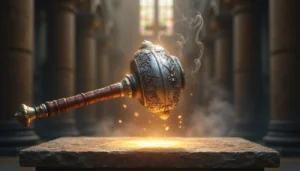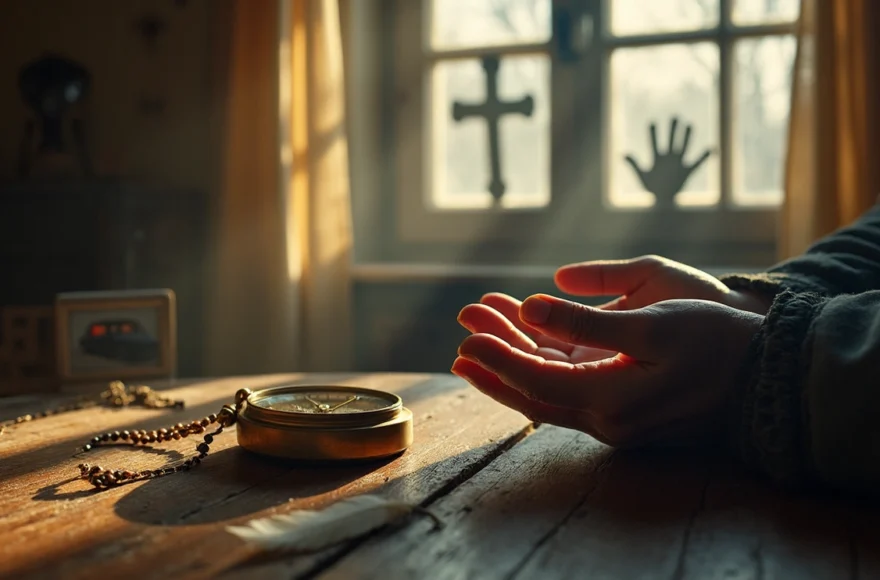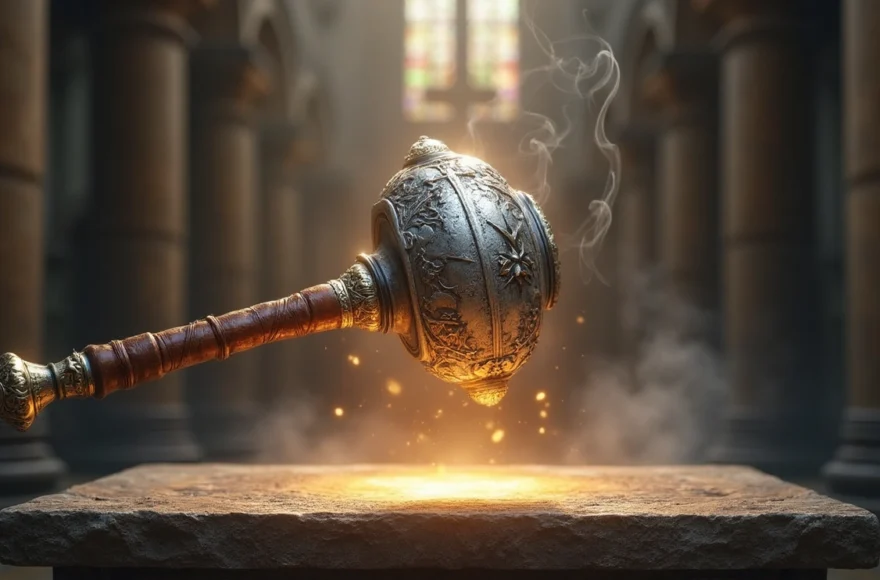Exploring Divine Intervention in the Odyssey: Key Moments
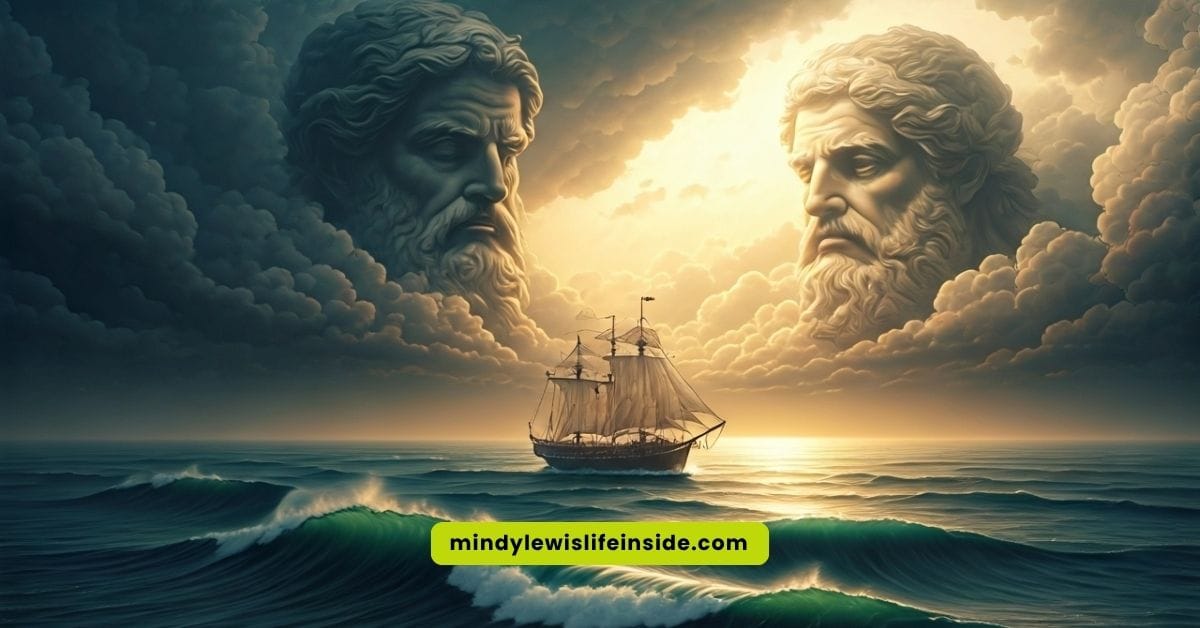
Last updated on July 11th, 2025 at 06:32 pm
As an Amazon Associate, I earn from qualifying purchases
Key Highlights
- Homer’s Odyssey showcases powerful divine intervention, where Greek gods like Athena and Poseidon play pivotal roles in shaping events.
- Athena, the goddess of wisdom, guides Odysseus with unmatched foresight, ensuring his return to Ithaca.
- Poseidon’s wrath against Odysseus showcases the challenges posed by the Greek gods.
- Hermes and Zeus intervene at critical moments, protecting or testing Odysseus and his companions.
- Understanding the motives of these gods reveals the dynamic interplay between fate and free will in Homer’s epic.
- The story highlights both the support and obstacles humans face due to the Greek gods’ unpredictable nature.
Introduction
Homer’s Odyssey is more than an adventure; it is a world where the Greek gods play a big role. In the epic, divine intervention happens often, particularly after the Trojan War. The gods are always involved in Odysseus’ tough trip back home.
Athena helps and guides, Poseidon gets angry, and Hermes uses clever ways to assist. All of these actions from the gods move the story forward. Every time these gods step in, the tale gets deeper, showing how the plans of people mix with what the gods want.
Understanding Divine Intervention in the Odyssey
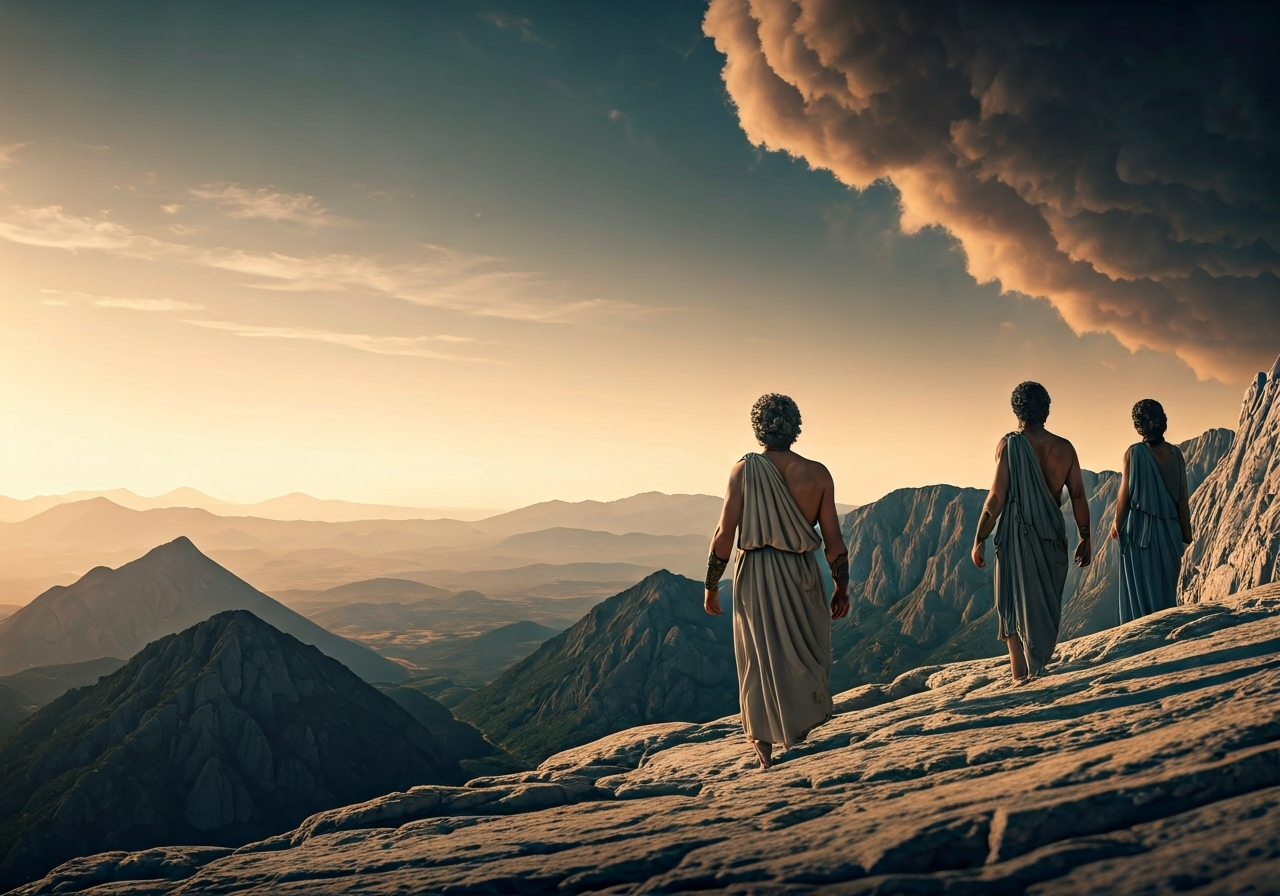 Divine intervention in Homer’s Odyssey shows the close link between mortals and the Greek gods. In this epic, the gods are strong and often hard to predict. They have a big impact on Odysseus’ journey. Sometimes, they help him. At other times, they make things harder. Their actions point to big ideas about fate and what is meant to happen.
Divine intervention in Homer’s Odyssey shows the close link between mortals and the Greek gods. In this epic, the gods are strong and often hard to predict. They have a big impact on Odysseus’ journey. Sometimes, they help him. At other times, they make things harder. Their actions point to big ideas about fate and what is meant to happen.
Homer talks about how divine intervention makes it hard to tell when people use their own efforts, and when the gods decide what will be. The Greek gods have their own likes and reasons for helping or hurting mortals. Their part in this story shows what they want and how much their choices affect human lives. Odysseus’ epic travel is really a place to look at both the power the gods have and how people can still keep going.
The Role of the Gods in Shaping Fate
The greek gods play a big part in Homer’s epic, the odyssey. These gods have a lot of power over odysseus and his fate. They guide his journey, but what they want changes how things happen for him. This makes you wonder if odysseus has any real choices or if everything is set before him by the gods.
zeus, who is the head of the gods, makes sure things are fair. Sometimes he punishes, and sometimes he is kind. Athena likes odysseus because he is smart, so she helps him, guiding him back to ithaca. poseidon, though, is angry because odysseus hurt his son polyphemus. So, poseidon puts many problems in odysseus’ way.
In the odyssey, fate comes from both the gods’ actions and what people choose to do. The gods aren’t in charge of everything, but they do a lot. Homer shows a mix between what people try to do and what the gods want. In the end, you are left thinking if odysseus suffers just because of his own choices, or if his path is already shaped by the gods.
Motives Behind Divine Actions
The Odyssey shows that gods have many reasons for getting involved with mortals. Some of these reasons are personal, others are part of a plan, and some have to do with who or what they care about in the world. These motives play a big part in what Odysseus faces and how his journey unfolds in this epic.
- Athena’s Favoritism: Athena helps Odysseus because she admires how smart and brave he is. She believes he stands out among mortals and deserves her support.
- Poseidon’s Fury: Poseidon becomes angry after Odysseus blinds his son, Polyphemus. This act makes Poseidon want payback.
- Zeus’ Balance: Zeus acts when the gods’ rules need to be kept. He punishes when some do not follow the rules and rewards those who stay loyal.
- Hermes’ Assistance: Hermes, being the messenger for the gods and for Zeus, helps Odysseus both to do his job and because he wants to support mortals.
This all shows the gods in the odyssey do not always act to be kind or cruel. They have their own reasons based on their values, ties to others, and the way they feel about the world.
Athena’s Influence on Odysseus’ Journey
 Athena, the goddess of wisdom, stands by Odysseus at every step in Homer’s Odyssey. She uses her clever ideas and stays close to the hero all the way. Athena can see what is coming, so she helps Odysseus live through Poseidon’s tough storms and all the troubles with the suitors in Ithaca.
Athena, the goddess of wisdom, stands by Odysseus at every step in Homer’s Odyssey. She uses her clever ideas and stays close to the hero all the way. Athena can see what is coming, so she helps Odysseus live through Poseidon’s tough storms and all the troubles with the suitors in Ithaca.
Athena does not just help Odysseus, she also looks after Telemachus and Penelope. She guides their journey in the Odyssey and makes sure Odysseus’ family is okay. In this way, the goddess shows how being strong, wise, and able to see what might happen can help people reach their goals.
Guiding Odysseus Through Perilous Trials
Athena is one of the greek gods seen in the Odyssey. She acts as a protector and planner for Odysseus. She helps him on his long journey by giving him advice at important times.
Athena helps him face many hard things and hides his true identity when it is needed. She uses her powers in smart ways. When Odysseus wants to get back to Ithaca, Athena makes him look young again. This helps him gain the trust of people who will help him.
She is always there in small but important ways. Her actions help Odysseus stay strong. It also shows that she knows a lot and believes he can get back home and take back his place. The help from the gods, like Athena, is key to his story.
Supporting Telemachus and Penelope
Athena does not only help Odysseus. She also steps in to guide Telemachus and Penelope. For Telemachus, she acts as a mentor. She takes on the form of an old friend named Mentor. She tells him to go and meet his father’s old friends in Pylos and Sparta. These trips give the young man more confidence and help him get ready to take back Ithaca.
Penelope gets help from Athena in another way. Athena comes to her in dreams. These dreams give Penelope hope that Odysseus is still alive. This hope helps her face the suitors who want to marry her and stay strong.
All these things show how Athena looks after Odysseus and his home. She works to keep the family and the land of Ithaca together until the real king returns. What she does also pulls together ideas of family, never giving up, and the wisdom that comes from the gods.
Hermes and His Role in the Odyssey
Hermes, though he may not be as famous as Athena, has a key part in Homer’s Odyssey. He is the messenger for the gods and he helps at very important moments as Odysseus walks his road.
| Moments | Hermes’ Role |
|---|---|
| Saving from Circe | Brings the herb moly to keep Odysseus safe from Circe’s magic. |
| Delivering Zeus’ Orders | Tells Calypso that Zeus wants her to let Odysseus go free. |
| Supporting the Voyage | Shares helpful advice and keeps Odysseus safe on his way. |
By helping in these ways, Hermes shows the mix between human cleverness and the control of the gods in the story. His help shows how all the gods work together to move things along in Odysseus’ journey in the Odyssey.
Poseidon’s Wrath and Its Consequences
Poseidon is the god of the sea. In the odyssey, he might be the strongest divine adversary for Odysseus. He gets angry because Odysseus blinds his son, Polyphemus. After that, Poseidon works to stop Odysseus by making one big problem after another. These are not easy to get around.
Poseidon’s anger can be seen in storms, shipwrecks, and long delays. Because of him, it takes years for Odysseus to return home. The other gods help Odysseus, but Poseidon keeps making sure things are hard for him. This fight with Poseidon makes people see that divine intervention can hurt, but it can also change someone for the better.
Punishing Odysseus for Blinding Polyphemus
Poseidon gets angry when Odysseus hurts his son, the Cyclops named Polyphemus. Odysseus stabs Polyphemus in the eye to get away, but when Odysseus tells Polyphemus his real name, his pride causes more trouble.
Polyphemus asks his father, Poseidon, to punish Odysseus. Poseidon hears his son and makes things hard for Odysseus. There are storms, and Odysseus faces many bad things while at sea. Every big wave and loud thunder from Poseidon shows us what can happen when people have too much pride and fight with the gods.
With Poseidon’s actions, Homer shows us just how strong the gods can be. They have the power to punish people when they want to.
Creating Obstacles on Odysseus’ Voyage
Poseidon’s nonstop interference makes things tough for Odysseus on his journey. Here is what Poseidon does:
- Violent Storms: Poseidon sends storms that force Odysseus off his path.
- Wrecking Ships: With his power, he wrecks ships and puts Odysseus in danger.
- Encounters with Monsters: He makes sure Odysseus will come face to face with scary sea monsters.
- Prolonging the Journey: Poseidon keeps Odysseus out at sea for ten long years, making every part of the trip feel harder.
All of this is done by the gods to test Odysseus and to show how hard and unpredictable their world can be.
Conclusion
In short, divine intervention in the Odyssey shows us how fate, power, and people being strong come together. The gods, like Athena and Poseidon, are very important in the story. They shape what happens to Odysseus on his long trip. Their help or trouble to him brings out big ideas, such as struggle and support. Sometimes, the gods guide heroes when things get hard. At other times, they create problems. All of this shows the twists and turns that destiny and free will can take.
Every time a god steps in, we see lessons about never giving up, being smart, and how choices matter. Looking at these acts from the gods helps us see how great and deep the story of this epic is. If you want to know more about the Odyssey and how divine intervention and Athena and Poseidon play their part, feel free to ask!
Frequently Asked Questions
Why do the gods intervene so often in the Odyssey?
The greek gods step in throughout Homer’s epic to show their power and set things right when they want, or because they hold grudges against each other. Sometimes, they also help mortals such as Odysseus. This shows how close the spirit world is to everyday people in old greek stories. What the gods choose to do changes the way Odysseus’s journey goes, and so their choices are big in this epic.
How does Athena’s intervention differ from Poseidon’s?
Athena gives wisdom and help to Odysseus. She acts like a guide for him. On the other hand, Poseidon gets angry and puts storms and many troubles in the way of the hero to punish him. Because of what they do, you can see Athena’s caring side. You also see how Poseidon will not stop trying to get back at Odysseus.
Are there moments when Odysseus succeeds without divine help?
Yes, even when the gods are part of the story, Odysseus often has to depend on his own mind and strong will. For example, when he came up with the smart idea to get away from the Cyclops Polyphemus, he used his quick thinking and ability to lead. This shows that what people do can also have a lot of power, not just the gods.
What lessons about fate and human effort are shown through divine intervention?
Homer shows how fate and human effort are connected because of what the gods do. There is divine intervention, but Odysseus makes it through by his own hard work and choices. This makes it clear that destiny might lead the way, but it is effort that decides what will happen in the end.
Which other gods or goddesses play significant roles in Odysseus’ journey?
Besides Athena and Poseidon, Zeus keeps things balanced in the world of the gods and mortals. Hermes helps when there is danger and people need him. Circe changes things and others with her power. Every god or goddess has a part to play on the journey. They show how the lives of mortals and the will of the gods mix and work together.
How does divine intervention shape the plot of The Odyssey?
Divine intervention in Homer’s epic poem, The Odyssey, significantly shapes the plot by influencing characters’ decisions and outcomes. Gods like Athena guide Odysseus, while Poseidon creates obstacles. These interventions illustrate the interplay between fate and free will, emphasizing the importance of divine favor in achieving goals and navigating challenges throughout the epic.
How does divine intervention shape the plot of The Odyssey?
Divine intervention in The Odyssey significantly influences the plot, guiding characters’ fates and decisions. Gods like Athena and Poseidon shape Odysseus’s journey, offering assistance or obstacles. These interventions highlight themes of fate versus free will, showcasing how divine forces intertwine with human actions throughout this epic tale.
As an Amazon Associate, I earn from qualifying purchases

